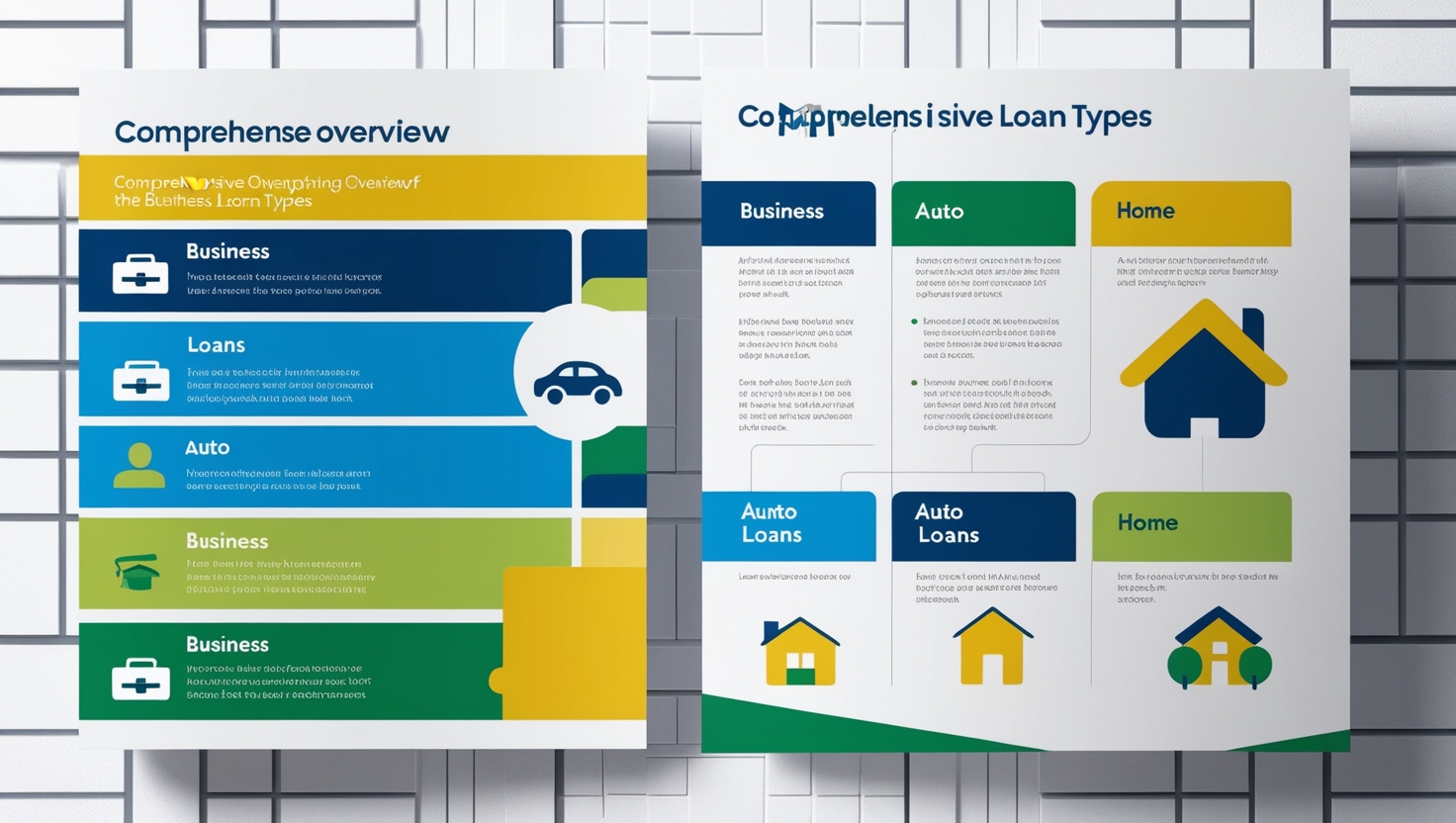Bank loans are highly significant for the modern economy today in aiding individuals and companies to finance their financial goals. From personal expenses to a business expansion, auto purchase, and home ownership, listed types of loans have different uses. This comprehensive overview will adopt four key areas of bank loans: personal loans, business loans, auto loans, and home loans. For each area, nature, pros, and cons related to these loans will be covered to enable you to make better financial decisions.
1. Personal Loans
Definition
Personal loans are an unsecured loan provided to an individual for multiple purposes of personal expenses. These loans can be used for a medical situation, a family vacation, clearing debt, or even home improvement.

Characteristics
- Non-Collateralized: This kind of loan is not secured, hence reachable to almost everybody with no greater assets holding.
- Loan Amounts: The amount borrowed ranges from a few hundred dollars to several thousands, typically from $1,000 to $50,000 depending on creditworthiness .
- Interest Rates: Interest rates can be fixed or variable. Fixed rate does not change over the course of a loan’s life, while variable rates change in response to changes in market conditions.
Repayment Terms: Personal loans are offered to be repaid over a period of anywhere from one to seven years, but some lenders might approve terms longer than that.
Benefits
- Flexibility: These loans may be used almost any time for nearly any purpose, which provides flexibility.
- Access to Funds Quickly: Most lenders offer fast approval, meaning the funds can be sent over in days.
- Debt Consolidation: Often a personal loan is taken for consolidating higher-interest debt. It reduces overall interest costs, which facilitates ease of monthly payments.
Drawbacks
- High Interest Rate: Compared to secured loans, personal loans carry a higher rate of interest since they are not covered by collateral. This is why secured loans always come with a lower rate of interest than personal loans.
- Dependent on Credit Score: Approval and even terms depend completely on the credit score of the borrower. A person with low credit score might not get a loan at that rate, not even getting one at all.
- Origination Fees: Some lenders even have origination fees or prepayment penalties, which usually contribute to the total cost of taking out the loan.
2. Commercial Loans
What is a Commercial Loan?
Commercial loans are financial products specifically designed to offer a company the capital it needs for operational expenses, including inventory purchases, expansion of facilities, or payroll.
Features
Business loans are available as secured or Secured ones require asset as a part of lending, while the latter may not necessarily require any asset but could have higher interest rates.
The business loan amount is based on the scale of the business as well as its specific needs, which usually vary between $5,000 and millions of dollars.
The interest rates on business loans depend upon the type of loan, credit profile of the borrower, and overall risk involved in giving the loan.
-Repayment Terms: They can be anything from months to years; relatively short terms are often associated with a few loans, and longer periods tend to be for a greater amount.
Business Loans
- Term Loans: The amount borrowed is for a fixed period of time and repaid in equal installments.
- Lines of Credit: A company has access to funds, like with a credit card, through the revolving credit option.
- SBA Loans: The Small Business Administration-guaranteed loans that offer favorable terms, especially low down payments, to small businesses.
- Equipment Financing: Loans strictly for purchasing business equipment that will be used as collateral to secure loans.

Benefits
Capital Access. Business loans become necessary funding in which to grow and operate the business.
Tax Benefits. Interest paid may be tax deductible that can help mitigate the overall cost of borrowing.
- Credit Building: Proper loan usage can assist the firm to increase the credit score, which positively impacts the ability of the firm to borrow further.
Drawbacks
- Complex Application Procedure: Procuring a business loan usually requires a lengthy application procedure involving extensive documentation and even past financial statements.
- Collateral Risk: In secured loans, the assets of the firm become susceptible to seizure in case of default in payments that can negatively affect the operations of the firm.
- Debt Potential: Debt does put pressures on cash flow within a business, especially for businesses that fail to meet their sales projections.
3. Auto Loans
Definition
Auto loans are to buy new and used cars, trucks, and motorcycles with the purpose of financing them.
Characteristics
- Secured Loans: The auto loan is secured using the vehicle, so if the person fails to make payments, he or she loses his or her car.
- Loan Amount: Loan amounts are determined by the amount of the vehicle’s price, and as with other programs, may vary from a minimum of $5,000 to higher than $100,000 if a luxury or specialty model.
- Interest Rates: The interest rates are either fixed or variable although fixed interest rates are preferred because they usually offer a great deal of predictability.
- Repayment Terms: Generally, the repayment period is between 36 to 72 months, but some lenders offer longer repayment terms.
Benefits
– Lower Interest Rates: Because the loan is protected by the vehicle, interest rates tend to be lower than with unsecured personal loans.
– Flexible Financing Options: Borrowers can usually select from a variety of financing options, including different length loan terms and payment plans.
– Building Credit: Consistent and on-time payments help build the credit score of the borrower.
Negative
- Depreciation: A car depreciates rapidly, putting it at risk of becoming “underwater” on a loan where the individual owes more than the car is worth.
- Collateral Risk: The vehicle may be repossessed by the lender if payments are missed, leaving the individual stranded without any means of transportation.
- Additional Costs: Other associated costs such as insurance and maintenance have to be factored by the individual in financing a vehicle for an individual to use as transportation.
4. Home Loans
Definition
Home loans, or mortgages, are designed to be large enough to finance the purchase of a house by a family. They are larger and for much longer terms than most other kinds of loans.
Characteristics
- Collateralized: Since a mortgage loan finances a real estate property, it uses that as security, hence minimizing the risk to the lender.
- Loan Amounts: The dollar amount borrowed in mortgage loans often is in tens of thousands, hundreds of thousands, or even millions of dollars.
Home loans may be available with either fixed or variable interest rates, which may change during the loan period, for fixed-rate loans, or during the loan term, for variable-rate loans. - Repayment Terms: The most common repayment term is 15, 20, or 30 years. Borrowers can opt for any of these terms as determined by their financial needs and preference.
Types of Home Loans
- Conventional Loans: This is a type of home loan, not insured by the government, and typically requires a good credit score and a sizeable down payment.
- FHA Loans: Insured by the Federal Housing Administration, allowing for lesser down payments and lower credits score.
- VA Loans: For the military or veterans, they have extremely favorable terms and often times pay nothing down.
- USDA Loans: For low to moderate-income people purchasing rural properties; often, no down payments are required.
Benefits
- Long term financing: Longer time spans of repaying a mortgage allow for lesser payments so that people can live in these homes longer.
- Deductible Taxes: Home loans interest is potentially deductible, thereby saving on living expenses.
- Equity Accumulated: On every payment, homeowners build equity, which they may utilize during subsequent financing or investments.
Downside
- Complexity of Application Process: Acquiring a mortgage involves complicated application processes characterized by documentation, various credit checks, and sometimes slow returns.
- Risk of Foreclosure: Missed payments or failing to pay the mortgage could result in foreclose; hence, the house is lost.
- Market Risk: Changes in property values affect equity and investment value.
Conclusion
Recognizing the other types of loans will be helpful for one to find their footing in the financial world. This is where different kinds of loans-the personal, business, auto, and home loan-have different uses, and therefore, different characteristics, advantages, and disadvantages. By knowing your status, creditworthiness, and the specific needs you have, you can always bet on picking the right kind of loan for the goal.
Financial advisors or banking professionals are sometimes consulted to give individually tailored advice and guidance to avoid a hasty decision to borrow, so that you clearly understand the terms involved, the risks associated, and the long-term implication of your loan. This way, you shall make informed decisions, leading to better financial well-being. With proper knowledge and planning, bank loans will then be useful instruments for the realization of personal and professional aspirations.
